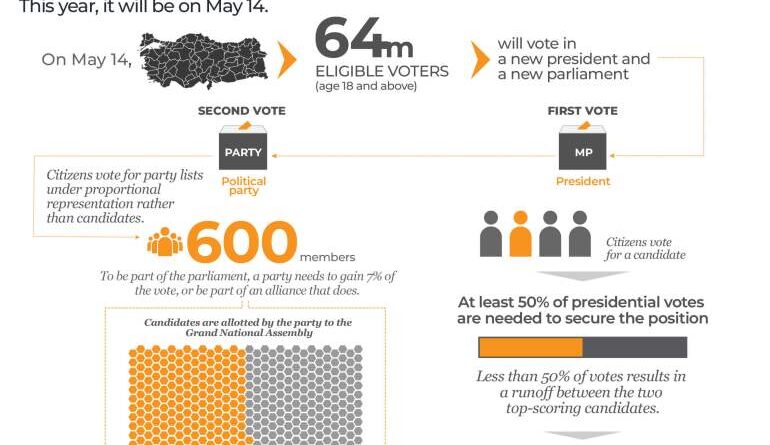
EXPLAINER
There are more than 64 million voters in Turkey, including more than six million first-time voters.
More than 64 million people can vote in Turkey’s presidential and parliamentary elections on May 14, with President Recep Tayyip Erdogan facing his toughest test in 20 years.
There are more than six million first-time voters in the high-stakes election, and the number of Turks abroad who could vote until May 9 exceeded 3.4 million.
Here’s everything you need to know about how the electoral system works:
What type of political system does Turkey have?
Turkey switched from a parliamentary to a presidential system in July 2018, a month after Erdogan won the presidential election. The president’s powers were expanded following a 2017 referendum that approved the switch to the executive presidency. The position of prime minister was abolished and the president also became the head of government. In the new system, voters directly elect the president.
(Al Jazeera)
How often are elections held?
Turkey holds simultaneous presidential and parliamentary elections every five years. The 2023 polls, originally scheduled for June 18, were brought forward to May 14.
Who can run for president?
A potential candidate must be a Turkish citizen, be at least 40 years old, and have a bachelor’s degree. Candidates are nominated by parties that have obtained at least 5 percent of the vote in previous parliamentary elections or that have 20 seats in parliament. A presidential aspirant could also seek a nomination by collecting 100,000 signatures of support from citizens.
How does a presidential candidate win?
A candidate needs more than 50 percent of the vote in the first round to win outright. If no one clears the 50 percent mark, the top two candidates will face off two weeks later, with this year’s vote set for May 28.
How do parliamentary elections work?

Elections for the 600-member National Assembly, as Turkey’s parliament is known, are conducted using a proportional representation system, so Turks vote for party lists rather than candidates and seat numbers they correspond to votes cast by party rather than alliances. The 600 members represent 87 electoral districts in 81 provinces. Electoral districts are allocated parliamentary seats in proportion to their population. To enter parliament, a party must obtain 7 percent of the vote or be part of an alliance that does so. Candidates must be at least 18 years old. To obtain a parliamentary majority, a party or alliance must have more than half, or 301, of the seats.
the current parliament of Turkey
Erdogan’s Adalet ve Kalkınma (Justice and Development, AK) Party has 285 seats. The AK Party’s ally, the far-right Milliyetçi Hareket Party (Nationalist Movement, MHP), has 48. The main opposition, the center-left Cumhuriyet Halk Party (Republican People’s Party, CHP) has 134 MPs. The CHP’s center-right ally, the Iyi Party (Bo) has 36 lawmakers. The pro-Kurdish party Halkların Demokratik (People’s Democratic Party, HDP) has 56 lawmakers.
What happened in 2022?
In April 2022, the electoral threshold was reduced from 10% to 7% after Parliament passed a law. The law changed the way seats are distributed between member parties in an alliance. Parliamentary seats were previously allocated according to the total votes received by an alliance. Now, seats will be distributed based on the votes received by an individual party. Therefore, alliances are used so that parties can overcome the electoral threshold. This also pits parties in an alliance against each other. The AK Party is part of the Cumhur İttifakı (People’s Alliance) whose parties fight elections separately, while the CHP is part of the six-party Millet İttifakı (National Alliance).
[ad_2]
Source link





